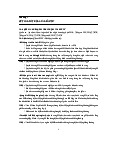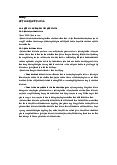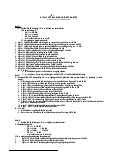








Preview text:
Chapter 1: The business environment Start up
Every day millions of people all over the world are involved in business activities. They may be
working for large international organizations with thousands of employees and business
interests in many countries, or for a local business with a small workforce. These businesses
may produce or sell goods, or they may provide services, such as tourism, medical care, or
education. And even the people who are not working are still involved in the business world as
consumers. Every purchase they make, every text message they send, helps a business achieve
its prime goal of making a profit.
Some businesses provide the goods and services that we all need to survive – food, water,
shelter, clothes, and warmth. These five basic needs exist in all societies, from the most
advanced to the least developed. In more developed societies, we let other people provide for
most of our needs in exchange for payment. For example, we rely on other people to produce
bread which arrives on our table through a series of financial transactions involving farmers,
merchants, millers, bakers, and retailers. People in business provide the goods which other
people need in return for profit. This, in its turn, enables them to pay for their own needs. The
whole business world is interconnected in this way.
Other businesses provide the goods and services that we don9t need, but prefer to have, such as
home entertainment products and leisure travel services. These extra items reflect our desires or
wants. Other wants include computers with ever-increasing capabilities and the latest mobile
phones. Modern economies depend on these wants continually increasing. And as they increase,
so more employees with specialized skills are needed, and millions of new jobs are created.
The growth of the Internet is having an enormous impact on the way we buy goods and services.
In fact, in 2005 UK consumers spent nearly as much on goods online (£8.2 billion) as in high-
street department stores (£9.4 billion). Questions:
1. Who are not working but still involved in the business world? Why?
2. Which type of transaction is used in developed societies?
3. Why do, in your opinion, people more and more prefer home entertainment products and leisure travel services? 1
4. Which type of service will, you think, develop positively in the coming time?
5. Find words or phrases in the text which mean:
- To obtain by paying money or its equivalent. - To join together. - Huge or vast.
- One who keeps a store or shop for the sale of goods.
- All the people who work for a company. Knowing yourself
Do the questionnaire. Put a tick (v) for 8yes9 or a cross (x) for 8no9.
What’s your style? What kind of person are you? What’s the right job for you? Find out with this questionnaire. 1. I enjoy teamwork. □ 2. I am good at problem- solving. □
3. I like using technology. □
4. I like being independent. □ 5. I am good at research. □
6. I like dealing with people. □
7. I don9t like working under pressure. □
8. I like traveling and meeting new people. □
9. I am good at dealing with money. □
10. I am not very good at organizing information. □
11. I like being creative. □
12. I don9t mind doing routine activities. □ Describing the job
Choose jobs from A, and use phrases from B to write sentences about each job.
Example: A bank clerk deals with money and meets people. A Bank clerk Sales representative Database administrator Computer operator Market researcher Personal assistant Secretary 2 B Ask people questions Write reports Arrange meetings Use a computer Deal with money Make phone calls Meet people Organize information Send emails and letters Travel Attend meetings Do research Sell products Reading
1. Work in groups. Discuss activities done in working time in the office. - Send private emails - Shop online - Text your friends - Flirt - Gossip - Eat - Surf the net - Look out the window - Read books or magazines - Listen to music - Doodle - Sleep
2. Read the text and answer the questions:
1. How much time each day do UK office workers spend for not working?
2. What9s their most popular non-work activity?
3. How much time each day do they spend using the computer for non-work activities?
4. What percentage of Italian office workers flirt in the office?
5. What do some employers do to reduce absenteeism in the office?
6. What do some employers do to make their staff happier at work?
3. Work in pairs. Discuss the questions:
- Did anything in the article surprise you?
- Do you consider these activities to be 8time- wasting9?
- Imagine you are the manager of a company. What would you do about these activities? Don’t disturb me – I’ m not working!
How do office workers spend their day? Well, they work of course, but they also find time for
other things. A recent report reveals the UK office workers spend about an hour and a half a day
on personal business. They spend 54 minutes gossiping, 16 minutes flirting, 14 minutes surfing
the net, 9 minutes emailing friends and family, and 3 minutes shopping online. 3
Surfing the net in the office time for personal reasons is common throughout Europe. Nearly
half of workers in Italy, the UK, and Germany confess to visiting sites for holidays and finance
when they should be working. In Italy, 4 out of 10 office workers flirt in the workplace and 1
out of 3 employees sends and receives text messages on their mobile during their working day.
Unsurprisingly, employers are not happy with this 8absenteeism in the office9. Many company
use filters to prevent surfing, and even turn off coffee machines to prevent gossip. In Milan, a
worker who regularly surfed unsuitable sites was suspended for ten days.
But is the best solution to stop workers socializing and surfing the net? After all, you don9t stop
thinking about work when you go home, and your private life doesn9t stop when you go to
work. A study of the best employers in the UK says that laughing with colleagues, socializing ,
and having fun creates a workplace where staff work the hardest! One successful company has a
room with perfumed oils and music, where staff can relax. Another offers games rooms and
satellite TV. It seems that only motivated workers give 100% attention to their jobs. Brainstorming
1. Life in 2030?
Governments and businesses need to plan for the future. But what is the future? Here are some
predictions. Are they right?
1. The fast growth of China9s economy and population will continue. China will be the
world9s number one economic power, and the USA will take second place, reducing the
European Union to third place.
2. In developed countries, nearly all manufacturing will be done by machines without
human help, so about 90% of jobs will be in the service sector.
3. Life expectancy will continue to increase and most people will continue working, either
full-time or part-time, until they are 70.
4. An approximately equal number of men and women will be employed in top
management positions in large companies.
5. The first hotel in space is already planned. By 2030, vacations on the Moon will be
expensive, but not too expensive for many ordinary families.
6. Scientists will not be able to change the world9s climates and reduce global warming.
7. Taking a year9s vacation from work will be common. Many companies will allow
employees a year9s unpaid vacation after three years.
8. In football, a team of robots will win the World Cup. 4 2. Vocabulary 1. Numbers
How to read these numbers in English? a. 513 b. 2,892 c. 2/3 d. 9.56 e. ½ f. ¾ g. 1/3 h. 0.5 i. 101st j. 1,234,567 k. ¼ l. 1/8 m. 5 ½ n. 13 ¾ o. 6 p. 24 2. Crossword
We can spend money and we can save it. But we can do a lot of other things with
money, too. Find 14 more verbs we can use with the word money in the square. You can
read some from left to right, some from top to bottom and some diagonally. I X L E N D X X X N X X D O W E G I V E M W V L X W E E O A X O H N I R S S K S E A R N X T X E X O V S P E N D B E T E F I N D 3. Wordcheck
Complete the puzzle and find the key word in 9 down 9 1 I 2 C 3 D 4 U 5 E 6 C 7 W 8 P 5 Across
1. The rate of ……… shows how fast prices are rising. (9)
2. ……… spending increases when the public has more money. (8)
3. He paid off all his ………, and now he has no money left. (5)
4. The ……….. figures show how many people are out of work. (12)
5. Goods which are sold abroad are classified as ………. (7)
6. There9s a fixed ………… of $60 a week for electricity. (6)
7. We pay the staff their ………. On Fridays. (5)
8. Does the price include airmail ………..? (7) Down
9. Banks charge their customers ……… on the money they borrow. (8) Speaking
A. Business know-how – getting on in business
• Learn more than one language
• Get a business qualification
• Network with family and friends
• Read business magazines and business sections in newspapers
• Try to get work experience in an office
B. Introducing yourself
1. You are going to attend a conference with two colleagues. Work in groups of three and complete your role cards.
• Choose the name of your company
• Choose your name. Either use your own name or invent another
• Choose the job you do for the company
• Note two or three of your responsibilities
• Now make a name card or a label so people know who you are
2. Now you are at the conference. It9s important to talk to the other conference-goers.
Try to keep the conversations going!
• Introduce yourself to someone from another company
• Find out who that person is, who they work for, and what they do
• Introduce that person to one of your colleagues 6
• Continue until your teacher stops you Name Company Job Responsibilities Writing Emails M – aking contact From: Angela Lopez To: Sabina Zawadzki1 Subject: Introduction2 Dear Ms Zawadzki,3
My name is Angela Lopez, and I am a Spanish student at Western Business College. I hope you
don9t mind me contacting you but I was given your name by my tutor, Donald Kelly.4
I am planning a career in publishing, and I am keen to learn more about the business. I am
writing to ask if there are any opportunities for work experience in your company. 5
Thank you for your attention. I hope to hear from you soon.6 Regards7 Angela Lopez8 1. Discuss these questions:
- What sort of information do you give when you introduce yourself to somebody?
- Do you find it easy to introduce yourself to someone you don9t know? 7
2. Label the parts of the email: Closing sentence Closing salutation Sender9s name Opening salutation Introduction
Recipient9s name / email address Subject line Reason for writing
3. Write an email introducing yourself to Tim White. He is a friend of your teacher and he runs
a small business. You would like to interview him for a project. Dilemma & Decision Harley’s Angels Brief
Jeffrey Bleustein, CEO of Harley Davidson, was thinking about the future. He had already
pulled the motorcycle manufacturer back from the brink of bankruptcy, but now he was thinking
of the serious problems that lay ahead. And top of the list was the fact that Harley Davidson
customers were definitely ageing. The black leather Angels were getting greyer every day. From
an average age of 36 ten years ago, the customer was now edging closer to 46. But what to do?
Bleustein decided that he would put the question to his team of advisors at the next meeting of
the strategic leadership council. In fact, may be he9d better tell them what he wanted them to do
right now – that way at the meeting they could present their ideas directly. Bleustein reached for the phone. Task
Work in groups. Prepare a proposal for the leadership council. Decide whether your approach
should be marketing, product, acquisition or distribution based. Some suggested ideas are as following:
Product development approach
Invest in new lighter and faster Harley Davidson models. This might attract a younger purchaser
and would change the image of HD products, which are associated with heavier cruising bikes. 8
Acquisition approach
Harley Davidson has acquired Buell, a small manufacturer of sport motorcycles. This could be
an opportunity to introduce a new range of sports bikes that would be marketed by existing HD
dealers but sold under the Buell brand.
Aggressive foreign expansion. HD has poor market penetration in Europe and the Far East.
Huge potential markets exist, especially in China which has annual sales of 14 million motorcycles.
Marketing approach
Concentrate on developing the merchandising sources of income by signing deals to develop the
HD brand on clothing and fashion accessories.
Distribution approach
Review the HD dealer network. At the moment the dealers are independent operations which
place orders with the parent company. It might be possible to develop sales through other outlets
(buyer clubs, specialist stores).
Develop a strong internet presence, possibly with direct internet sales. 9




